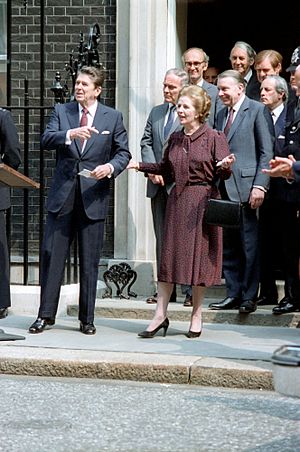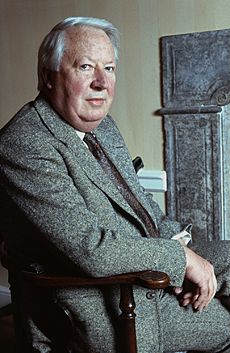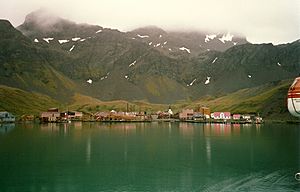Rejoice (Margaret Thatcher) facts for kids

"Rejoice" was a famous word spoken by British Prime Minister Margaret Thatcher on April 25, 1982. She said it outside her home at 10 Downing Street after a big announcement. The announcement was about British forces successfully taking back South Georgia from Argentine forces during the Falklands War.
A reporter asked, "What happens next, Mr Nott?" (referring to the Defence Secretary, John Nott). Thatcher quickly stepped in and said, "just rejoice at that news and congratulate our forces and the Marines." As she went back inside, she said "rejoice" again.
This word caused some debate. Some people thought it was too proud or boastful, especially since soldiers might have died. Others believed it showed her strong support for the British forces and her great relief after a successful mission. The phrase, often repeated as "rejoice, rejoice," has been used in speeches and art ever since.
The Falklands War and South Georgia
The Falklands War started on April 2, 1982, when Argentina invaded the Falkland Islands, which were a British territory. The next day, they also invaded the island of South Georgia.
Prime Minister Margaret Thatcher quickly sent a large group of navy ships, called a naval task force, to the islands. They had to travel about 8,000 miles (13,000 km) to get there and take the islands back.
Thatcher decided to retake South Georgia first. This plan was called Operation Paraquet. She and other leaders thought it would be an easy win. They hoped it would make people support the war more and show Argentina that Britain was serious.
Early attempts to land British special forces on April 22 were difficult because of bad weather. Two helicopters were lost, and Thatcher was very worried about the 17 men on board. Luckily, they were all rescued later.
On April 25, British Royal Marines successfully landed on South Georgia. They captured the Argentine soldiers at Grytviken without any British soldiers being hurt. This was a big victory!
The Famous Statement
The news of the victory was shared at a press conference outside 10 Downing Street on April 25. Margaret Thatcher came out, followed closely by her Defence Secretary, John Nott.
Thatcher introduced Nott to the reporters, saying, "The Secretary of State for Defence has just come over to give me some very good news and I think you'd like to have it at once."
Nott then read a statement. He announced that British forces had landed on South Georgia and that the Argentine soldiers had surrendered. He confirmed that no British soldiers were hurt. Nott ended by reading a message from the commander of the mission: "Be pleased to inform Her Majesty that the White Ensign flies alongside the Union Jack in South Georgia. God save the Queen."
After Nott finished, Thatcher started to walk back inside. A reporter asked, "What happens next, Mr Nott?" Thatcher then stepped in and said, "Just rejoice at that news and congratulate our forces and the Marines." As she reached the door, she said "rejoice" again before going inside.
What "Rejoice" Meant

The word "rejoice" caused a lot of discussion. Some people saw it as a simple call to celebrate a British military success. Others thought it was disrespectful because it didn't seem to consider the possibility of soldiers losing their lives. They also felt it showed Thatcher's government was becoming too extreme in its national pride.
Thatcher's opponents often used the phrase, sometimes saying "rejoice, rejoice." Some believed Thatcher was also happy about her rising popularity in public opinion polls during the war. Her approval ratings went up a lot, which helped her win the 1983 general election by a large margin.
Some people saw the statement as a sign of Thatcher's strong leadership. They felt it showed her confidence and how she viewed the war as a fight between "good and evil." Others, including one of Thatcher's biographers, believed she said "rejoice" more as a way to stop reporters from asking too many questions, rather than as an order to the public. They also thought it showed her huge relief that the mission was successful.
The phrase "Rejoice, Rejoice" was also the title of an artwork created in 1983 by Michael Peel. This artwork aimed to show the human cost of the war.
Years later, in 1990, Edward Heath, who was Prime Minister before Thatcher, repeated the phrase when Thatcher resigned. In 2004, Labour Prime Minister Tony Blair also used the word "rejoice" in the House of Commons after the Iraq War. He said, "whatever mistakes have been made, rejoice that Iraq can have such a future." This caused some of his own party members to shout "Thatcher!"
Thatcher herself used the word again in 2007, marking 25 years since the Falklands were retaken. She said, "the whole nation rejoiced at the success; and we should still rejoice."


